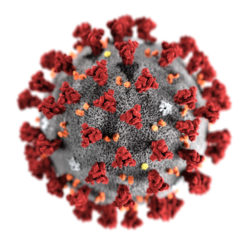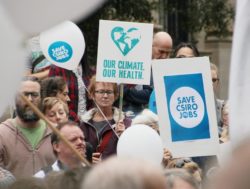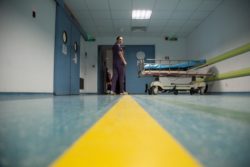Health Security
We represent one of the biggest hubs of Political Science and International Relations scholars working on global health security in the UK, and one of the largest globally. Our researchers have worked with the WHO, UNDP, Drugs for Neglected Diseases initiative (DNDi), Nuffield Trust, P4Health, regional health communities and national governments to inform political solutions for global health security challenges.
Our research and work is premised on the assumption that there can be no genuine and resilient global health security without essential capacities and resources present at all levels of global society, from the multilateral to the local. Meaningful global health security requires equitable access to health services and technologies and responses to the interlinkages between health and other global challenges, such as climate change, inequality and poverty. We work toward evidence for the need for increased collective global capacities and resources to respond to health threats and challenges. This reflects the interdependent and currently under-financed nature of global health security.
The School of Politics and International Studies has made significant recent investment in the area of health security, hiring Professor Garrett Wallace Brown (formerly Sheffield) as Chair in Global Health Policy, Dr Owain Williams (formerly Queensland), who specialises in public health and International Relations, and Dr Anne-Sophie Jung (formerly London School of Hygiene and Tropical Medicine), whose work deals with the politics and governance of a range of health security issues such as anti-microbial resistance. Their research interests complement long-established School expertise in global public health, particularly in the area of International Development. Dr Anne-Sophie Jung leads the Health Security research theme.
Covid-19: Today's Global Security Challenge
 In collaboration with the Centre for Global Development, our researchers have played advisory roles in the UK Cabinet Office COVID-19 Response Roundtable, which examines key priorities regarding the economy, health and international relations. Our insights are subsequently included in a series of reports for Cabinet Ministers and the Prime Minister. Professor Garrett Brown works with the WHO Director of Evidence and Analytics for Health Security (EHS), which is operational arm of the WHO’s new Health Security Preparedness programme, which has drawn on Brown’s research (BMJ) to help underwrite the new ‘Health Systems for Health Security’ framework currently being developed at the WHO.
In collaboration with the Centre for Global Development, our researchers have played advisory roles in the UK Cabinet Office COVID-19 Response Roundtable, which examines key priorities regarding the economy, health and international relations. Our insights are subsequently included in a series of reports for Cabinet Ministers and the Prime Minister. Professor Garrett Brown works with the WHO Director of Evidence and Analytics for Health Security (EHS), which is operational arm of the WHO’s new Health Security Preparedness programme, which has drawn on Brown’s research (BMJ) to help underwrite the new ‘Health Systems for Health Security’ framework currently being developed at the WHO.
Dr Anne-Sophie Jung has published in British Medical Journal and Nature Medicine on responses to the Covid pandemic. This includes key lessons on health systems resilience.
Dr Neil Winn has collaborated with colleagues in Business to track local public interest in Covid-19 using natural language processing. This EPSRC and QR England funded work has developed AI tracing tools for covid misinformation.
Dr Owain Williams has established the ‘COVID-19 Diaries’ as a community space for global public health scholars to record their lived experiences of the pandemic. Contributors include leading experts from around the world. His research has underpinned public-facing publications on Covid, for example in the Telegraph.
Work by Drs Emma-Louise Anderson, Laura Considine and Amy Patterson draws attention to how to power and trust matters for COVID-19 and the lessons we can learn for the current crisis. The failures of the global response highlight how power struggles between and among states, intergovernmental organizations, societal actors, and individual leaders can undermine urgently needed cooperation. We are building on this work to understand how to make the COVID-19 response more robust in Malawi as informing future preparedness across Africa.
And recent research by Dr Yoshi Kobayashi published in Social Science & Medicine examines how prejudice against foreign countries affect vaccine hesitancy. Dr Kobayashi is also working on three related projects, with colleagues in the United States and Japan, exploring: 1) how the WHO's endorsements of vaccines influence people’s vaccination intensions; 2) how the WHO’s guidance against border closures and countries’ international legal commitments influence people’s preferences over border restrictions; 3) how prejudice against foreign countries affect preferences over foreign vaccines.
Climate change, health, and human security
 Before COVID-19, Polis researchers were working on other important global health security challenges, such as HIV/AIDS, Ebola, and neglected tropical infectious diseases (NTIDs). For example:
Before COVID-19, Polis researchers were working on other important global health security challenges, such as HIV/AIDS, Ebola, and neglected tropical infectious diseases (NTIDs). For example:
- Dr Emma-Louise Anderson’s work with Amy Patterson questions how local actors respond to Africa’s high dependence on donor health funds for HIV.
- Dr Markus Fraundorfer argues that a variety of actors from governments, academia, civil society and the private sector must join forces to establish a mechanism with the potential to considerably accelerate research and development (R&D) on Ebola.
- and Professor Garrett Brown is analysing the global-regional nexus on NTID governance.
Going forward, CGSC is beginning to explore the intersection of global security challenges, building on our longstanding strengths in human security (see Professor Ted Newman's work) and growing expertise in climate change (see Professor Olaf Corry's work). For example, Dr Owain Williams will be buiding on previous work with Pacific Regional partners to look at the linkages between climate change and human health, and the erosion of multiple forms of human and health security by climate driven impacts.
Health systems and health security
 Highlight: Profesor Garrett Brown and Dr Owain Williams are conducting new research in tandem with the WHO and partners in the World Universities Network toward buidling evidence for substantial revitalisation of publicly provided health services in LMICs and HICs to provide resilient and accessible health services to counter pandemic threats and respond to the upstream determinants of health vulnerabilites.
Highlight: Profesor Garrett Brown and Dr Owain Williams are conducting new research in tandem with the WHO and partners in the World Universities Network toward buidling evidence for substantial revitalisation of publicly provided health services in LMICs and HICs to provide resilient and accessible health services to counter pandemic threats and respond to the upstream determinants of health vulnerabilites.
Highlight: From the specifics of mapping and evaluating the long-term effects of performance-based financing on health systems, to the development of new global theories of 'somatic security', our researchers are tackling the challenge posed by the interaction of global capitalism and global health. Dr Owain Williams' work intervenes in the global health security debate to argue that the primary focus of global health security – that infectious disease is an existential security threat to both humans and vital infrastructures – only tells one part of the story about the meaning and significance of biological danger in the contemporary context. He traces how advances in science and technology, particularly through the intermingling of computer science and molecular biology, have altered understandings of what biology is. He explores the informationalization of biology, as part of an emergent global political economy of health security, forwarding the concept of a somatic-security industrial complex to capture this dynamic.
Highlight: Dr Anne-Sophie Jung's research has explored the key systemic drivers and implications of anti-microbial resistance. As part of an international team, Dr Jung's work has put forward important policy lessons to deal with this pressing global health security challenge.
Sustainable pandemic preparedness and response (PPR) financing
The failures of the international COVID-19 response highlighted key gaps in pandemic preparedness and response (PPR) at global, regional and national levels. As a result, an additional US$31.1 billion at the country level, and US$10.5 billion at the global level, has been requested by the World Bank and World Health Organization to strengthen the global PPR architecture. However, the feasibility and potential effectiveness of this funding have not been fully explored. An ESRC-funded project, in collaboration with The Center for Policy Impact in Global Health (Duke University) and Open Consultants aims to assess the current PPR financing architecture to interrogate the feasibility of meeting the PPR financing targets, and identify remaining obstacles that risk undermining the effectiveness of PPR financing mechanisms. The findings have been published across two policy briefs, in a Future Development blog, with peer-reviewed articles forthcoming.
In collaboration with Transparency International Global Health, the University of Leeds research team won additional funding to conduct an analysis of common challenges facing health financing instruments. The findings have been published in a policy brief ‘Overcoming Governance Challenges in International Health Financing’ which sets out a number of key recommendations that can increase the effectiveness of the new World Bank Pandemic Fund.
Learn more about about this research on financing future pandemics here.
